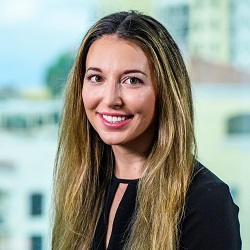The interview below is part of an ongoing effort by McGuireWoods to profile women leaders in private equity (PE). To read previous profiles, click here. To recommend a woman for a future interview, email [email protected].

Erin Lansky is a principal at Blue Sea Capital. She assists with identifying, evaluating and executing investment opportunities as well as providing ongoing support to the firm’s portfolio companies. A member of Blue Sea’s healthcare team, she leads the firm’s investment efforts across medical devices, healthcare products and medtech opportunities.
Prior to joining Blue Sea, Lansky was a vice president at RoundTable Healthcare Partners, an operating-oriented healthcare private equity firm. Prior to RoundTable, she was a vice president with BDT Capital Partners and an associate on GTCR’s healthcare team in Chicago. Lansky began her career as an investment banking analyst in the global mergers and acquisitions group of Bank of America Merrill Lynch in New York.
Q: What do you think is the biggest challenge facing women entrepreneurs today? What perspectives do you have on addressing this challenge?
Erin Lansky: Stating the obvious, entrepreneurs who identify as women or people of color will rarely see themselves in the investors to whom they pitch their business. The investment community — those who control the growth capital that funds entrepreneur-led companies — is still, resoundingly, white men. And these investors don’t always “get it.” Diverse entrepreneurs are starved for discerning, aligned capital partners who don’t require handholding to understand and support their visions.
This has left a major, uneconomic disconnect between diverse entrepreneurs with great ideas and investors with the capital to fund them. But it has also created a market opportunity for those investors who will.
For example, Lauren Leibrandt is an investment banker who helps raise growth capital for attractive, often women-led opportunities in health, beauty and wellness. A lot of men are too uncomfortable, unwilling or uninterested in asking diligence questions about menopausal health or sexual wellness products, so these companies are relatively underfunded within the broader healthcare ecosystem. Many investors have similarly passed on opportunities to develop skincare for people of color, a category and market need that so many consumers — and many non-white or non-male investors — would find painfully ripe for investment. Over a decade ago, Aarti Kapoor identified boutique fitness and wellness as a financeable, fundable and ultimately bankable sector that, at the time, many male bankers shrugged off as fleeting and feminine. Now she is CEO of VMG Consumer Acquisition Corp.
Having a woman across the table, in those rooms, with a meaningful voice in investment committee discussions, would help investors make better decisions and entrepreneurs find better capital partners.
Q: Why is it important for more women to pursue careers in PE?
EL: I would instead challenge PE to encourage more women to join our industry. Time and again, I hear teams complain that we lack qualified, diverse candidates. “Women never apply.” “Our pipeline is only white guys.” It is logically unsound to conclude that the candidates are the problem. The problem is the process. If you can’t find women candidates, then your system — for identifying, attracting, retaining and championing non-white, non-male candidates — is broken.
We should be excited to do as much. Our investment returns depend on sound decision-making, which is informed by healthy, collaborative debate among diverse perspectives. Our industry has grown exponentially and become increasingly competitive over the last several decades. Those who fail to adapt — whose deal teams, investment committees and decision-makers remain dominated by white male voices — should fully expect to see their returns underperform those of diverse peers. We compete and win by bringing a diversity of perspectives to the table and listening to them.
Q: What is a lesson that you have learned concerning what’s required for success in PE?
EL: The ability to “zoom in and zoom out” quickly and clearly is critical. Early in your career, analytical prowess is everything. You are deep in the weeds, myopically focused on being the teammate closest to the details, all over the numbers. Yet, what makes you successful over time is the ability to zoom out, ask “what does this mean” and effectively adapt and pivot your efforts accordingly, and then quickly zoom back in and do the same with rigor and effectiveness. For people at all levels, success is the ability to grasp and process both the details and the bigger picture simultaneously — the what and the so what.
Q: What both attracted you to PE but potentially concerned you about this chosen career path?
EL: I have always been a liberal arts person to my core, and I am an avid, lifelong learner. Arriving at Dartmouth, I had no idea what I didn’t want to study — and I also had no idea what PE, investment banking or corporate finance was. I was hired as an intern on Wall Street because I could learn quickly, not because I had any immediately applicable skills. I had truly never even used Excel. I learned it on the job from incredible mentors in the M&A group at Bank of America Merrill Lynch.
That was intimidating, to say the least, especially amidst peers who took courses on investment banking or accounting. That said, for me, the intensity, breadth and depth of learning were exhilarating and propelled me to the top of my banking class and to PE, following in the footsteps of my young mentors.
That intimidation, or not feeling good enough or ready enough, understandably keeps a lot of high-potential people back. Yet for the deeply intellectually curious, PE is one of the most gratifying careers. I would strongly encourage women and non-white individuals — amongst whom this classic impostor syndrome seems almost ubiquitous — to lean into that discomfort and explore our industry. For me, it’s led to an incredibly gratifying career to date, within an industry I’m excited and motivated to advance in the years to come.
To contact Erin Lansky, email [email protected].